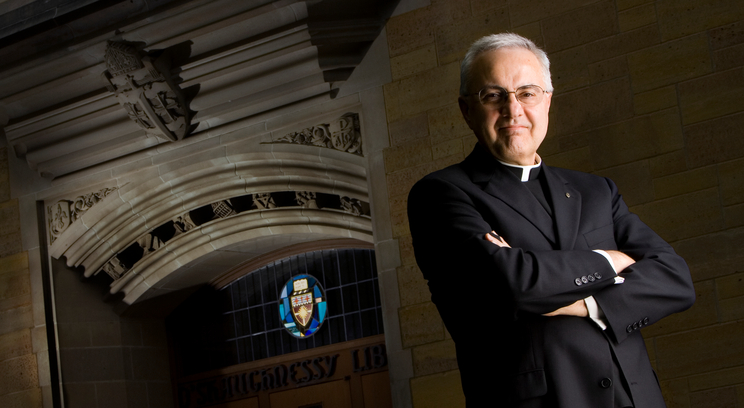As I walked with a colleague down 17th Street in Washington, D.C., last June, I turned to look at the White House. Wondering how I would get through security for a meeting, I asked, "What will I have to do to get in?"
Without missing a beat, he responded, "First, you focus on the Iowa caucuses."
Everyone is a comedian, even in Washington. I was there on serious business, though: Trying to convince the Obama administration to consider a more vigorous use of the pardon power. It’s an idea I have pursued at the wholesale level, through scholarship and meetings like that one, and at retail, through the sentence commutation clinic we began in August 2011 at the University of St. Thomas School of Law. It’s a project that, in just one year, has taken my students and me on a fascinating tour, from the dusty federal prison in Victorville, Calif., to the power corridors of the nation’s Capitol.
When we think about the pardon power, we tend to remember its troubling use in the recent past – President Ford’s pre-emptive pardon of President Nixon, the disastrous clemency President Clinton gave to Marc Rich, or (at the state level) the somewhat bizarre use of the pardon power by Mississippi Gov. Haley Barbour as he left office. What these examples obscure is the rich and deep history of the pardon power in American life. George Washington was the first president to use it, when he showed mercy to the leaders of the Whisky Rebellion. President Harding pardoned his political opponent, Eugene Debs, and President Truman granted clemency to Puerto Rican nationalists who tried to kill him. The pardon power, promoted by Alexander Hamilton and beloved by Abraham Lincoln, should be much more than a footnote to the constitution.
Moreover, and importantly to Christian scholars such as myself, the pardon power is one of the few clear embodiments of Christian virtue in the Constitution. Christ, after all, effectively pardoned the adulteress described in John 8, and was himself denied clemency by Pontius Pilate. As Hamilton recognized in the Federalist Papers (No. 74), the core value of the pardon power is nothing less than mercy. That constitutional power of the president includes two primary methods to dispense such mercy: the ability to remove a conviction entirely (a pardon) or to simply shorten a sentence (a commutation). It is unchecked, unreviewable and absolute.
It’s a broad and bold project, then, to resuscitate this desecrated clause. My students at St. Thomas are working to do exactly that.
One of the real strengths of St. Thomas’ law school is our clinical program, which gives our students not only real-life experience but also a skill set they will use in practice. One crucial skill for attorneys, for example, is developing the narrative of a client’s experience, and it is that ability which lies at the heart of our new clinic on federal commutation. In the clinic, we appeal to the president to shorten the sentences of our clients by telling their stories through a formal petition.
Getting to that story often is difficult. By definition, our clients are incarcerated, often in far-off corners of the nation. That’s also how two St. Thomas students, Nancy Ly ’12 J.D. and Vicky Wanta ’12 J.D., ended up in Victorville, Calif., trying to get into prison to visit their client.

Nancy Ly (Photo by Mike Ekern '02)
Breaking out of prison is supposed to be difficult, but getting in can be pretty tough, too. One of the things I want my students to experience is the often petty bureaucracy that is involved in the world of criminal law. Ly and Wanta arrived in Victorville and first had to find the right prison – there is a complex of facilities there, for different types of offenders, and for men and women. After one miss, they found the right facility (for low-risk women) and struggled to finesse the process of getting in to see their client. After several hours they succeeded and met Jacquelynne Sutton, whose story they would tell.
That story started with Sutton’s life in the prison, which was a combination of depressing details and surprising opportunities. There was the awful distance from her family, many of whom remain in Minnesota. On the other hand, the prison allowed Sutton to become a skilled beautician and even to work on and drive vehicles being prepared for the Border Patrol. As they reported back from Victorville on what they were learning, I noticed that my two students were experiencing surprise after surprise as they entered this new world.
During their two days visiting with Sutton, her story became real and whole. She had received a 10-year sentence for involvement in a narcotics case involving more than 100 grams of crack cocaine. That, of course, is never the whole story, though. Ly and Wanta learned about Sutton’s family, about her work, and about the complexity of her involvement with the crime. Simple things became complex, and some things that at first appeared complex were revealed as simple.
When Ly and Wanta returned, they debriefed the other members of the sentence commutation clinic on what they had learned. The story was fascinating, and the conclusion was clear: there was no problem being solved, no societal advantage gained, by the lengthy incarceration imposed on their client. Having made their report and discussed the options going forward with their colleagues, they then turned to the task at hand: petitioning Barack Obama to commute the sentence. Whether they will succeed is an open question – petitions take months to process – but the petition was masterful, particularly in the way that it wove the strands of Sutton’s life together in a way that was sympathetic, compelling and true.

Jacquelynne Sutton
The last few sentences of the petition reflect not only their emphasis as advocates on rehabilitation, but their own perspective on their client: "She knows what she did wrong in the past and has learned how to do better in the future. [She] asks for this commutation so she can be with her children, restart her life, and prove to society that she is not only deserving of this second chance but that she is more than the worst thing she has ever done."
Their client may not get the benefit of commutation; few do. But Sutton will always be assured that her story is known. Sutton herself described the importance of this better than I can in an entry she wrote for a contest at Yale Law School:
"I laid in bed every night praying that Professor Osler would choose my case. Three months passed and I received a letter from Vicky Wanta and Nancy Ly, informing me my case had been chosen. I almost passed out at mail call. I was flabbergasted.
"I carefully read over the letter five times, making sure I didn’t miss anything. Nancy and Vicky were law students from the University of St. Thomas, a college I was familiar with. As a child, I always wanted to go there after participating in the National Youth Sports Program. I filled out my retainer information, which asked for absolutely nothing but my signature. I realize anyone can fill out a petition, but for me the feeling was much deeper. It meant something to be picked out of the other individuals; it meant something to me that someone actually wanted to help me, that somebody I didn’t know cared."
Sutton was right; Ly and Wanta did care.

Vicky Wanta (Photo by Mike Ekern '02)
The work of St. Thomas students in the clinic has led to other important opportunities. In April, the St. Thomas Law Journal hosted a symposium on the topic of commutations, which was the first U.S. academic conference on the issue in 10 years. It gathered virtually all of the people who study the issue, along with judges, a commutation recipient and an award-winning journalist, Dafna Linzer (who had previously written about our clinic in the Washington Post). The conference spurred further activity to push for change in the field of clemency. Specifically, a month later the American Constitution Society and the Open Society Foundation, along with U.S. Rep. Bobby Scott of Virginia, hosted expert testimony in the halls of Congress. I was one of the speakers and brought along St. Thomas student Clay Harris to help out with my work in the Capitol. Like Ly and Wanta, Harris did a superb job of addressing issues at a national level in a way that lives out the mission of the law school.
Part of the discussion at that hearing was an article I had written a year earlier, suggesting that a troubling sentencing issue be addressed through commutation in the same way that President Ford dealt with draft evaders; specifically, Congress had (in 2010) drastically lowered sentences for certain crack offenses, but had not made them retroactive – meaning that people such as Sutton would not get the benefit of the change. I was suggesting that the Ford model be used to equalize those sentences to the levels described in the new law.
That idea caught the imagination of people in Washington, and soon I returned twice to meet with President Obama’s domestic policy advisers about the idea. What started with our little clinic was now being presented, in purple St. Thomas folders, to those who could change the world for people such as Jacquelynne Sutton.
The second meeting in Washington was held in the vice president’s ceremonial office, a grand space that resembles nothing so much as a small gallery in an art museum. A portrait of Teddy Roosevelt looks down from one end, and a grand fireplace dominates the other. The long, oval table was topped with discreet notes describing its age and fragility. It is a space that creates an air of proper solemnity.
With her commutation petition safely delivered to Washington, Sutton continued to compose her essay for the Yale Law School contest. Sutton describes what our students are capable of and reflects on the moment when her case was chosen:
"When I received a copy of the completed petition, where there was an overview from Nancy and Vicky, tears came from my eyes. After coming to prison and accepting a 10-year sentence, it’s hard to think that there was any good left within myself. I had completely forgotten about all my goals and the person I wanted to be, because of the negative lifestyle I had enrolled myself in.
"I remain in contact with Nancy Ly and Vicky Wanta. Not only did they do a wonderful job putting together my petition, they’ve also helped me realize just how far I’ve actually come from the person I used to be. ... I feel I’ve been granted a second chance at life, a new beginning, regardless if I win or lose my petition."
As a teacher, that is just about as good as it gets. The harsh law under which Sutton was sentenced may not be solving a problem, but Ly and Wanta, through hard work and good hearts, just might.

About the Author: Mark Osler is a professor at the School of Law. Osler is a former federal prosecutor whose work often addresses the problems of inflexibility in sentencing and corrections.
Read more from St. Thomas Magazine.







